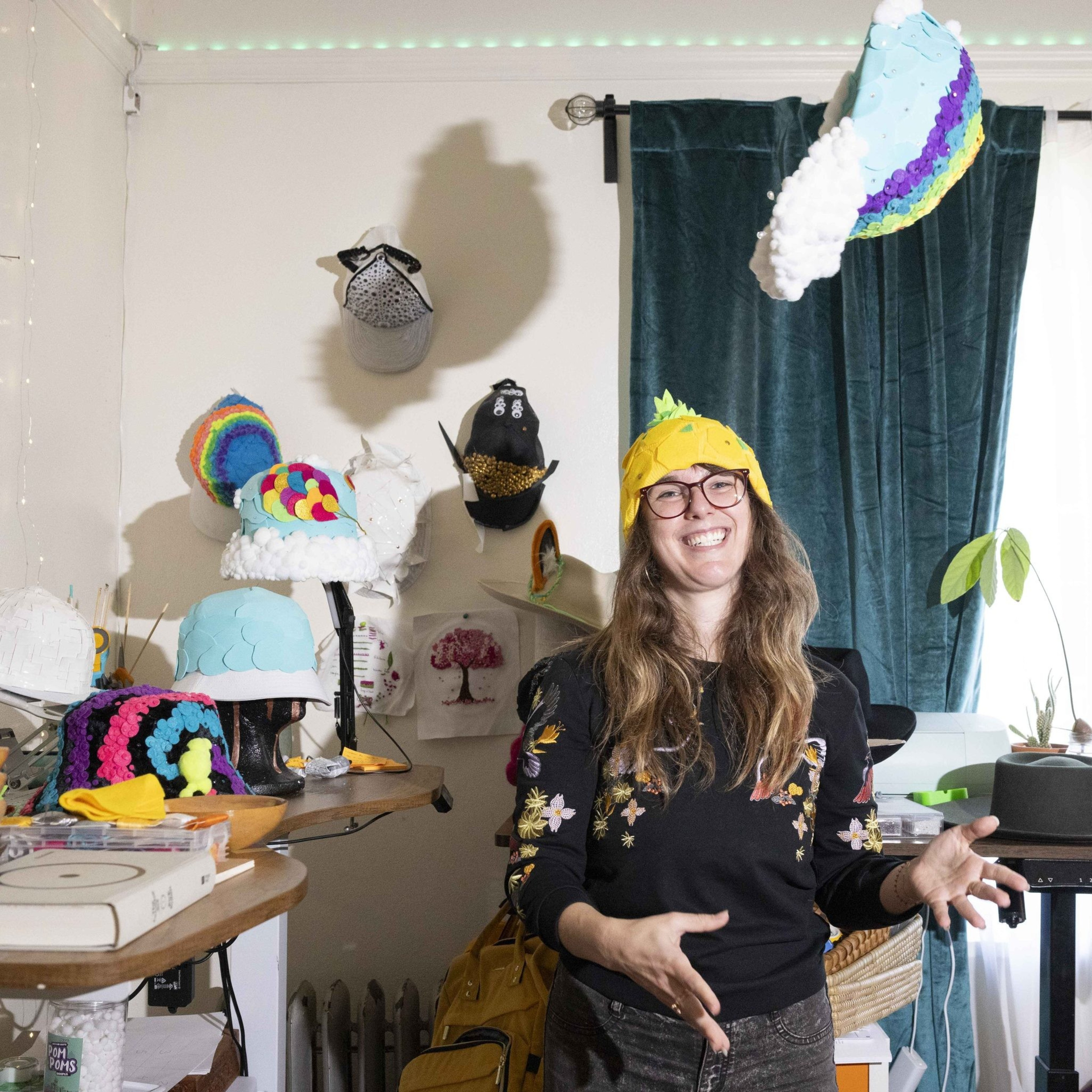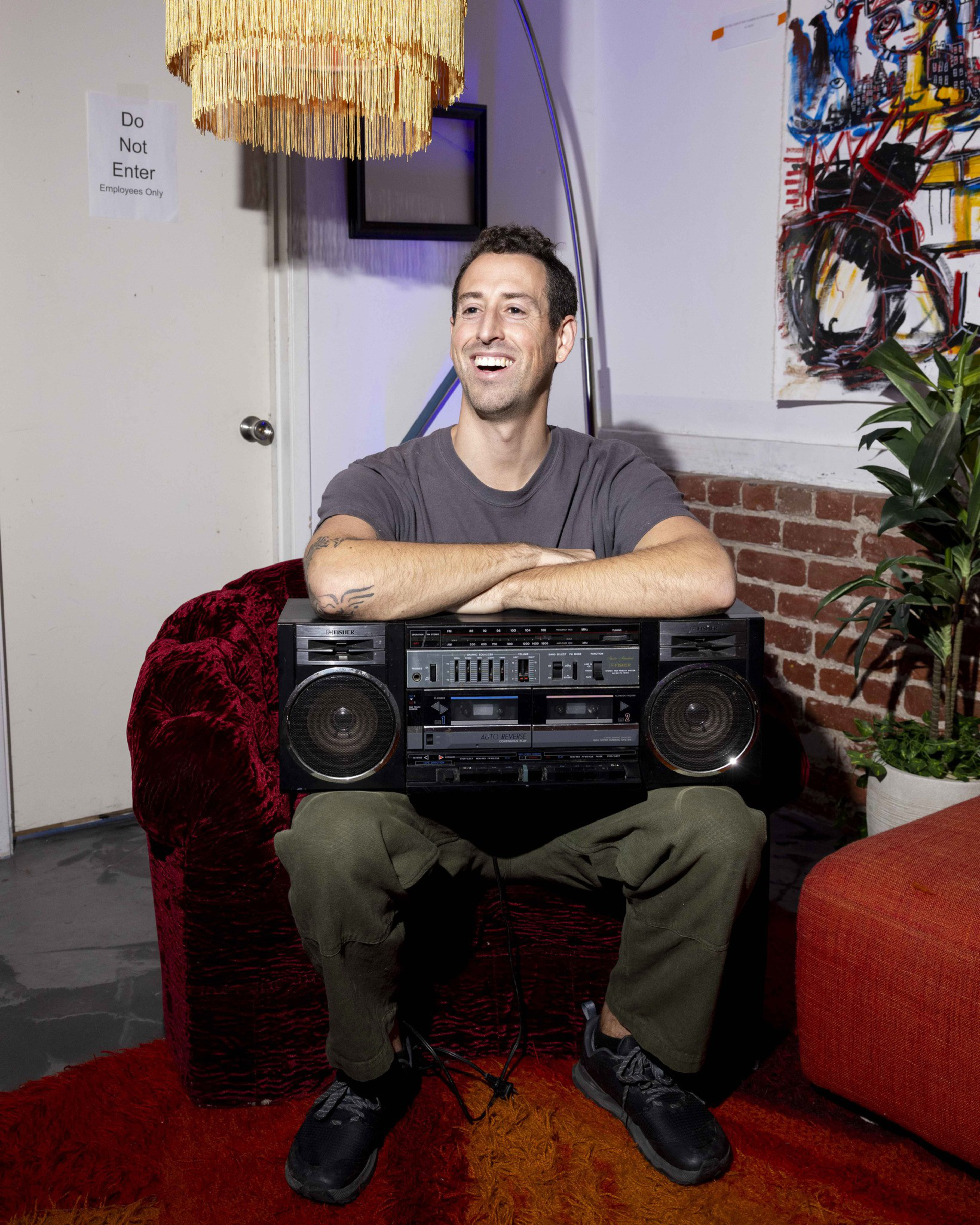In the year and a half since Sandy McClenahan lost her tech job, she traded her work-issued laptop for a hat block, rhinestones, googly eyes, faux fur, and a dizzying array of glues. Her old company let her keep the external monitor, which became host to dozens of colorful Post-its.
McClenahan was disenchanted by post-layoff career prospects and decided to explore other options while working through her severance.
“Tech was supposed to have so much security and stability, but that’s an illusion,” she said. “It’s not actually true; you’re just a number at a company.”
In the months since she’s built a different life for herself: She works as a production assistant at a local hatmaker (opens in new tab) and helps a jewelry artist (opens in new tab) with sales. The hat gig came via efforts to construct her own whimsical headgear (opens in new tab), though her creations are currently only prototypes.

“I’ve amazed myself with what I’ve learned to do — I shock myself constantly,” McClenahan said. “This was all sitting within me, dormant, shoved underneath too many emails and work meetings and not being able to turn myself off.”
She’s not alone in making a major life pivot. Several years of brutal layoffs at startups and Big Tech have prompted some San Francisco residents to look beyond the industry. That might mean diving headfirst into a new field or, like McClenahan, patching together a career of part-time gigs.
The idea of flexibility wooed Meghan Butler. She was an executive at a software company but got a pink slip shortly after it went public. Now she works as an assistant to an interior designer and is building a consultancy to help creatives with business strategies.


“I’m just tired of working for arrogant assholes,” she said. “As a woman in tech, you get talked down to. You really get treated like garbage.”
She now has a strict “no jerks” rule in her professional life. In hindsight, she sees her layoff as a fortunate disruption: “I got a nice little package and got sent on my way,” she said. “It made me really evaluate whether I wanted to be in the tech industry, which can take, take, take so much from people and drop them without a thought.”
Generous severance packages help give tech workers the time to switch gears.
Andrew Wasilewski, who managed to live “very frugally” on his layoff package while launching the Faight Collective (opens in new tab), a music and art community in the Lower Haight, signed the lease for the space with his business partners mere weeks after his last day of work in tech sales.
“I work significantly more hours than I ever did in tech and am making significantly less money,” he said. “But we believe it’s gonna pay off and that what we’re doing matters.”
More purpose, fewer vacations
Finding oneself post-tech is not all rainbows. The trade-offs — particularly when it comes to salary — can be dramatic.
One of Wasilewski’s co-founders, Daniel Bondi also left a tech sales gig to focus on the Faight Collective. The partners have adapted their lifestyles to cut out unnecessary spending.
“I’m not really eating out, and if I do, I go to Mythic Pizza and have the highest-calorie-per-dollar item on Haight Street,” Bondi said. (For the record, that’s the $9.75 chicken parmesan sandwich.)


The Faight founders found dirt-cheap furniture and leaned on friends for favors in renovating their space. The duo are clear-eyed about the real chance for failure but feel the risk is worth taking and admit it helps that they’re unencumbered by mortgages or kids.
“There’s an idea that if you work in tech you’re OK with having golden handcuffs, but that doesn’t need to be true,” Wasilewski said. “If you dream of starting your own thing or changing up your life in a big way, you can just try it.”
Butler and her husband scaled back vacations to cut costs and explained the changes to their kids. The upside to her new gig? More family time, with Butler joining school and sports events she previously missed.
“If you’re not just looking for dollar signs, there’s so many other great options that don’t necessarily cause the same degree of stress, anxiety, and overwhelm that the tech industry famously causes,” she said.
For McClenahan, the pay cut (and lack of company-funded health insurance) has eaten into her savings, and the adjustment has been admittedly scary. She lives in a 20-person co-living community and is worried about finding affordable housing when her lease ends next year.
“I’ve had days where I’ve been in absolute despair, like how am I going to keep doing this?” she said. But she’s not ready to give in to the “siren song” of the tech world. “I’ve tasted this freedom and a sense of this other way that things could be.”

She realized she’d rather lean into creativity than fatten up her bank account at a joy-sucking job: “I’m just trying to figure it out, a little bit at a time, and trying not to beat myself up on the days when it feels easier to go back to tech.”
While recent tech runaways often look back wistfully at their old career perks, Manville Chan is proof that those feelings can fade.
He never expected to leave tech: After getting laid off eight years ago, he jumped into a job search and even moved from Texas to the Bay Area to heighten his chances.
But after myriad dead-end interviews, he started hosting dinner parties and cooking classes (opens in new tab). Once companies began approaching him for corporate events, he realized his daily job search might be holding him back.
He honed his skills in a cooking program in Japan, then launched Story of Ramen (opens in new tab) in the Mission, which has hosted ramen-making classes for tens of thousands of people over six years. While navigating SF’s small-business bureaucracy and surviving Covid as a brick-and-mortar operation tested his mettle, he’s much happier as a founder than he was at any of his software jobs.
The layoff that felt like a devastating blow was, in retrospect, “one of the best things that ever happened to my life,” Chan said. “I would never go back. I always joke that the only thing that I miss is PTO. Nothing else.”
Old skills for new work
Despite being in drastically different industries, each tech defector has found ways to put old skills to work.
Chan, for example, leaned on his technology know-how to create an AI system to respond to emails more quickly. Wasilewski and Bondi use their software-selling skills slinging hand-crafted local goods and throwing art parties.
Butler’s product management background is the foundation for the business she’s launching.
“My job was to talk to engineers and take their jibber-jabber and translate it into a timeline, digestible tasks, and information that was client-friendly while managing risks,” she said. The ability to boil down complex ideas, while keeping specifics in her head, is a major value for her new customers.
McClenahan has relied on her professional project management and customer success chops to build her business connections. Oh, and she integrated an old tech badge into one of her hat designs.
“Maybe I will go back into a full-time tech job eventually, but the choices that I make about the work that I do will be so different,” she said. “I won’t be scrolling through LinkedIn and looking at what’s the closest to my old salary or ‘What could I tolerate?’”
